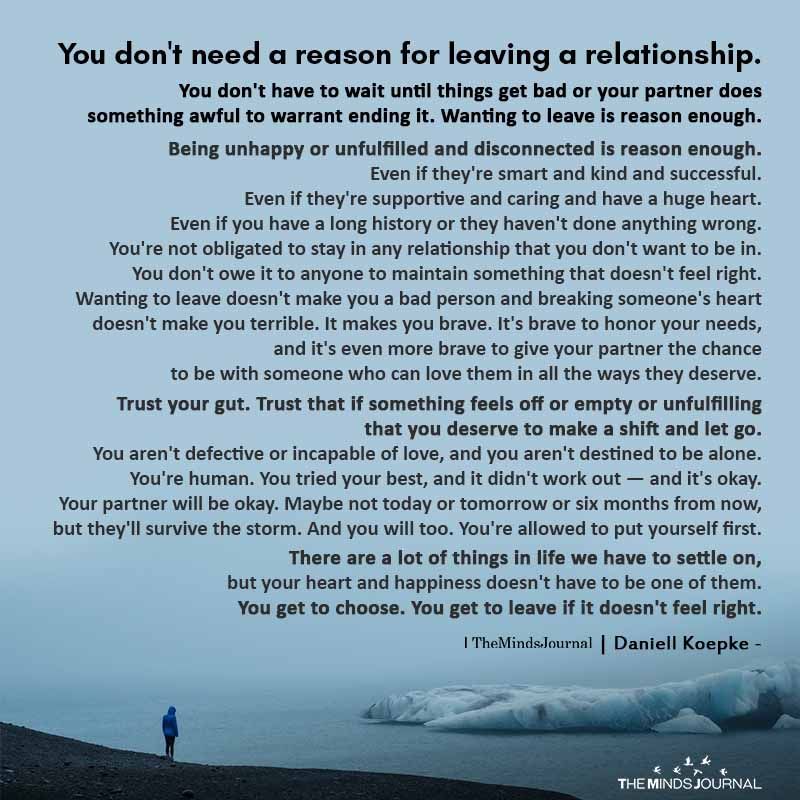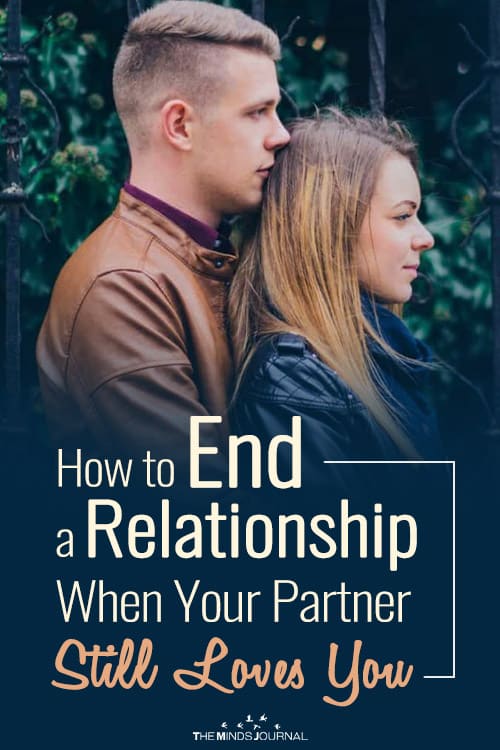If you have found yourself in a relationship that has lost its meaning for you, how can you minimize the stress on your partner and yourself? How to leave a partner who still loves you without hurting the other?
Most people who commit to a long-term relationship feel positive about their chances of staying with their partner. They realize that all relationships wax and wane, and do their best to look at the good while ignoring the bad. Unfortunately, those feelings can change over time, and many intimate partners will at some point know that, for them, the relationship is over.
The majority of people in committed relationships don’t make these choices rashly. Most often, they’ve done everything they can to stay in love with their partners, but have not been able to regain the positive feelings they once knew. If both partners have come to that conclusion together, the parting can be amicable and they may even stay friends.
But if one partner wants out and the other is still fully committed to the relationship, the exiting partner must now face the sorrow they are likely to cause and deal with his or her own distress at creating it. Over decades of working with couples, I have seen many people suffer the wounds of these types of conflicts.
Read 13 Red Flags Of A Doomed Relationship
They ask me for guidance on how to leave a partner without causing any more distress than necessary.
They must deal with their own guilt as well as with the heartache of a person they once loved. Those feelings are compounded if they have known themselves what it’s like to have been left behind.
They want to know if it is ever possible to end a relationship and leave a partner with dignity and mutual respect. Most everyone who has loved another deeply does not want to leave hurtful memories behind or deal with someone who harbors anger and resentment toward them.
They didn’t start their relationship with the intent of abandoning the ship. Nor did they expect that they would someday no longer care for the person. Now they are faced with going back on promises and leave a partner wounded. The truth is that the expectations of the partners in a new intimate relationship often change over time and promises made in the earnest fade.
Most relationships face challenges that catch the couple unaware. They may unconsciously repeat destructive patterns from prior relationships, or choose partners for the wrong reasons, blinded by attractions that fade over time.
It is common for new lovers to put their best foot forward by hiding things about themselves that they fear might turn a new lover away. If the relationship gets a sound foundation, perhaps those imagined or real flaws would be more easily overlooked. Once those behaviors emerge, however, the new partner is likely to feel betrayed, legitimately wondering what else might be hidden. Sometimes the damage comes from outside pressures that neither partner could have predicted.
Even relationships that start out with authenticity can develop difficulties over time. Communication problems, disparities in desires, or changing needs can all create problems that neither partner expected or had the capacity to solve.
For whatever reason, the partner who has lost faith in the relationship begins to pull away, sometimes silently, but sometimes with a barrage of criticisms leveled at the other partner.
The partner still fully into the relationship often doesn’t see or ignores the dwindling intimacy until it is obvious that the relationship is in trouble. At that point, he or she will begin to inquire and challenge, seeking some clarification. If the needing-to-go partner is uncomfortable or not quite ready for the conflict, he or she might deny that anything is wrong, encouraging false hope.
Being stripped of the status of someone’s “most-important person” is usually traumatic.
A partner might initially respond by trying to invalidate the severity of the problem while simultaneously trying to erase the cause for concern. Those twin behaviors, unfortunately, can make the partner trying to get out feeling trapped.
The response promises something that has no chance of happening and may only cause more distress later when the need to end the relationship and leave a partner resurfaces.
Another common response when you leave a partner is to strike out with anger and blame, holding the abandoning partner accountable for the relationship’s demise. Being dropped in status is not something anyone wants to experience, and feelings of being displaced, erased or replaced create emotional pain and self-doubt. Sometimes the rage and counter-invalidations cover more vulnerable feelings inside that are too vulnerable or painful to share.

If you have found yourself in a relationship that has lost its meaning for you, It’s time to leave a partner. But, how can you minimize the stress on your partner and yourself? How to End a Relationship When Your Partner Still Loves You?
1. Look at yourself:
Is this a pattern in your relationships? Do you overcommit and then find yourself in deeper than you intended? Do you try doing everything you can to make your partner feel more important to you than he or she actually is, just to keep that person close? Do you withhold asking for the changes you need and then resent the other for not knowing what they are? Do you put partners on pedestals by ignoring things about them you will eventually be unable to bear? Do you accommodate and then resent your sacrifices?
You will want to do your part and search for your own account so that you are open and willing to share that when you approach your partner. When you leave a partner tell them why you did not deal with the problems in the relationship earlier, and how that lack of honesty may have led your partner to believe you were more attached than you were. If you can do that with sincerity and directness, you are less likely to encounter defensiveness and counter-blame.
Caveat:
Hopefully, you are not already involved with someone else when you decided to leave a partner. Overlapping relationships severely complicate an interaction that is already difficult. If you have begun a new relationship and your partner suspects, don’t lie about it. That will only make things worse. It is a double-edged sword: Though it is painful in a different way to have been dumped for another, it may not be as bad as feeling unlovable.
Read 11 Signs Your Ex Still Loves You
2. Tell your partner when there is open-ended time to process whatever needs to be shared.
Tell him or her that you have something painful and difficult to share and that you are taking full responsibility for not having talked about it sooner. Make sure you are authentically regretful and remorseful about having made a choice to keep things seemed okay when they were not, and that you realize how hard you have made it by waiting until there was no hope for change.
Ask your partner if he or she can try to listen to the ways you have separated out of the relationship and why you did not share your feelings earlier. Don’t blame or bring up things that your partner has done to you, even if they are relevant. Focus on taking full accountability for setting your partner up to believe that you were more in than you were. Be direct and concise. When you leave a partner, tell him or her that you are sad for any heartache you have caused and that you want to do everything you can to make the separation as easy as possible.
3. It is hard to leave a partner, but be prepared to listen to their responses without getting defensive or resorting to counterattacks.
When you leave a partner who still loves you, he or she is likely to be angry, embarrassed, wounded, and confused. He or she will say things intended to make you feel worse about yourself or plead to be given another chance. You may be interrogated about whether or not you have already found someone else. Your job is to listen as long as your partner needs you to, to stay compassionate, and to hold on to your self-respect. Remember that your goal is to make it as easy on your partner as possible.
Read 17 Surefire Signs Your Ex Still Loves You (And What To Do About It)
Your partner may get angry and want to hurt you back by telling you to get out, calling mutual friends to let them know what you’ve done, threatening to hurt themselves, pleading for more time, or even trying to seduce you. These are understandable responses to unexpected rejection. Grief has many vehicles for expression, and you have probably seen your partner’s way of dealing with other losses in the past.
It is crucial that you stay calm, self-accountable, and supportive when you leave a partner who still loves you. No matter how much pain your partner is in or how he or she comes back at you, do not change your position or make promises you cannot keep just to make the situation easier. Stringing a partner along when you are certain about leaving can be tormenting, even if it makes the moment more bearable.
4. Offer to do whatever you can to ease your partner’s distress over a traumatic loss he or she cannot stop.
Ask him or her to tell you if there is anything you can do to ease the situation. Some partners may want you to leave immediately, some will want you to stay in hope that you will change your mind, and some will leave you and seek refuge elsewhere. Depending on how long you’ve been together, there will be more complications to sort out and memories to put away as you leave a partner. Even when the personal part of a relationship ends, there are attachments to friends and family, shared possessions, or even mutually beloved pets that can prolong the process of separation.
When you leave a partner, he or she will likely go through many rounds of pain, anger, confusion, pleading, and grief. He or she will bring up the situation over and over, trying to make sense of what has gone wrong. You may get asked the same question repeatedly or get endless phone calls and texts. Be courageous and compassionate without giving your partner any false hope.
Read 10 Signs You’re Stuck In A Dead End Relationship, Even If You Love Your Partner
5. Learn from what has just happened.
Search for what you might have seen earlier had you been more aware and discerning of your partner’s needs, and your own. Know that it is so much easier to be fully authentic from the beginning. You could have known better had you understood yourself deeply and could have predicted your own capacity to sustain intimacy.
No matter what has caused this painful situation, you don’t want to rack up points for who was right or who was wrong. Negative judgments of yourself or your partner will only keep you from knowing how to do it better the next time.
Make some sacred promises to yourself that you will learn from this experience and be more open and communicative with your next partner about who you are, what you need, and what you can contribute.
Written by Randi Gunther Ph.D. Originally appeared in Psychology Today Republished with permission










Leave a Reply